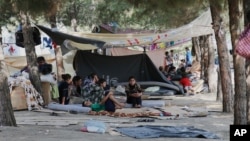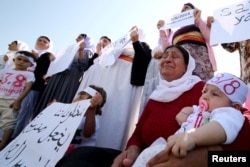Hoping for a safe haven after fleeing the Islamic State in Iraq, many Yazidis who came to Turkey are instead finding a difficult and uncertain life.
Confined mostly to Kurdish municipality-administered camps, they lack official refugee status, which leaves them in a legal limbo with no rights. They also lack access to needed medical care because they are officially not recognized as refugees.
"We don’t even have the right to be treated at state hospitals," said Simo Xwededa, a Yazidi man who were settled with his family in a camp in Diyarbakir. "My 5-year-old daughter had a heart disease and she needed a surgery. No hospital would take her in."
The daughter, who is back in the camp, was given medical care at an Istanbul hospital after a Kurdish benefactor paid $7,500 for her treatments.
"Our situation here is really miserable," Xwededa said. "Our children don’t receive proper education and it doesn’t seem that we’re going back home anytime soon."
Turkey feels strain
Since the start of Syria's civil war in 2012 and the rise of IS in Iraq and Syria, Turkey has been overwhelmed by people fleeing both countries. Turkey is hosting some 3 million displaced people, including 2.7 million Syrians, and is calling on the international community to help with the burden.
Yazidis, a minority sect in the region, represent a trickle of the displaced living in Turkey. About 30,000 Yazidis fled to Turkey after an IS massacre in northern Iraq in 2014, according to the Turkish Research Center on Asylum and Migration, which monitors numbers of displaced people in Turkey.
Many have been settled in the camps of municipalities run by the pro-Kurdish Democratic Regions Party. Some live in the same houses in Yazidi villages that Yazidis had abandoned decades earlier when they moved from Turkey.
Even though Kurdish forces in northern Iraq have retaken Yazidi enclaves from IS, many of them refuse to return, saying their houses are destroyed and they fear a return of Islamic State militants.Turkish officials say they are overwhelmed by the numbers of Syrian refugees and are struggling to provide proper help for Yazidis.
"They are not properly taken care of in Turkey," said Ali Atalan, a Yazidi member of the Turkish parliament.
Reluctant Yazidis
Yazidis say they are reluctant to be settled in Syrian refugee camps run by the Turkish government.
"They think that those in the Syrian camps are relatives of Islamic State militants," Atalan said. "They are scared."
Yazidis, too, are caught in a maze of legal arguments over their status in Turkey that have left them in a bureaucratic limbo.
"Only Syrians are granted the right to temporary protection because Iraq is not considered a continuing war zone, like Syria," a Turkish immigration official in Diyarbakir told VOA.
Metin Corabatir, president of the Ankara-based migration research center, disagrees, saying Yazidis should be treated equally to Syrian refugees.
"According to Turkish law, temporary protection may be provided for foreigners who have arrived at or crossed the borders of Turkey in a massive influx situation seeking immediate and temporary protection," Corabatir said.
Omer Eryilmaz, a health official who worked at a Yazidi camp in Diyarbakir, said Yazidis continue to seek legal status but face legal obstacles.
"Last year, we applied for humanitarian residence permits for 20 Yazidis," he said. "Only one was granted. We applied for the permit on behalf of 1,050 people last month and are still awaiting the results."
In the meantime, some Yazidis have left Turkey illegally for Europe. Others have made their way back to Iraq despite their fear. There is no official count as to how many Yazidis remain in Turkey.






